

EAP Publications | Virtual Library | Magazine Rack | Search
Join the Ecological Solutions Roundtable
edited by
William Lockeretz Center for the Biology of Natural Systems Washington University St. Louis, Missouri
Proceedings of a conference held at Washington University, St. Louis, MO June 17-19, 1976
Stuart B. Hill and Jennifer A. Ramsay
Modern agriculture's great advances in productivity have come as a result of heavy dependence on inputs of finite resources. Examining agricultural efficiency in terms of energy relationships is a first step towards correcting this situation. The major task before us is to identify or to design non-fossil fuel dependent and non-polluting agricultural strategies that can be permanent and that can cater to the individual nutritional needs of people. Energy accounting is useful in identifying approaches that are most- relevant to the former objective, but is limited in relation to the latter.
Lack of sensitivity to environmental constraints led to the "environment crisis" which, despite its declining publicity, still remains. We are now concerned with the "energy crisis" resulting, in this case, from an insensitivity to resource constraints. Our current economic problems are closely related to these [11] as will be the next crisis, which we believe will be in the area of food quality and health. It appears that our actions are dictated by a "crisis psychology" in which our attention is continually shifting from one problem to the next; because of this, we have been unable to perceive the interrelationships between these crises and their effects upon us (Fig. 1). This is the dilemma that we face, and unless we can solve it, we cannot expect our species to survive.
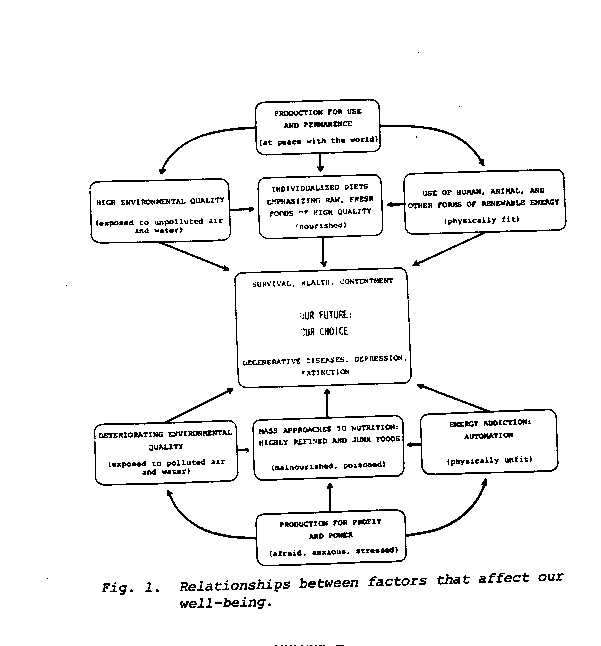
Energy studies, by exposing both the dependence of our food system on fossil fuels and the different energy/food conversion efficiencies of alternative systems, have provided policy makers with valuable information. However, it is unlikely that they will make the best use of this as they are responsive primarily to economic and power pressures, and not to those dictated by resources and the environment.
Many of the people involved in these studies recognize the urgent need for change. Their first reaction to the lack of response by policy makers has usually been to carry out further studies to strengthen their case. However, there is no reason to believe that policy makers will respond to more of the same kind of data, regardless of their scientific merit. This situation causes considerable frustration to the scientists concerned. Some may withdraw to areas of research that are less politically disturbing (the real brain-drain). Others may continue trying to perfect their arguments (which leads to further frustration and a waste of manpower and resources). A few realize that the problem is not a scientific, but rather a political and socio-economic one and step into that arena; however, lacking experience in that area, they are usually ineffective and may even harm their cause.
We are not advocating that scientists become policy makers; nor are we suggesting that the latter establish policies, as is often the rule, based only on the narrow approach that have developed in response to the latest crisis. Indeed, there are dangers in allowing specialists, familiar with only one aspect of a problem, to propose solutions. We need to examine the system as a whole. The apparent success of "specialist solutions," often based on the treatment of symptoms, has prevented us from viewing the incredibly complex system on which our survival depends, and in so doing, we are gambling with our future. If we are to deal with these problems we must understand the laws by which life and the natural environment function and establish political and socio-economic systems that are consequential upon them.
In this paper we will examine the contribution that energy studies have made to our understanding of the food system and consider some of their short-comings. We will then consider the basic laws on which this system ultimately depends, and suggest alternative approaches that might be taken. We will be using non-mathematical, deductive models based on "eco logical wisdom" [57] and common sense.
Energy studies have revealed six important features of our food system:
1) Energy requirements within the food system are small relative to other sectors of the economy.
In Canada, "the total energy used to get food on the table represents 12 to 15% of total national energy consumption" [15].
2) In terms of energy conversions our food system is inefficient.
We are investing 5 to 10 times as much energy (as fossil fuels) in North America as we are getting back in the form of food [7,17,19,25,28,40,49,59,61,66]. 3) There is a large variation in energy conversion efficiency between different crop and livestock systems [35].
At one extreme, feedlot beef production in North America may involve 100:1 conversion [45], while rice production in China can be 1:50 [24], and some organic farms have been shown to use one-third the energy of conventional farms [36,37].
4) Most of the energy consumed within the food chain is used for processing, packaging and preparation.
Energy use within the food system is distributed as follows: processing and packaging, 30%; preparation, 30%; storage and transportation, 20%; used on the farm, 20%; [28,66]. Thus, by growing your own food, or buying locally grown organic produce in season, and eating it raw, nearly 90% of the energy requirement can be eliminated.
5) Our dependence on fossil fuels is relatively recent.
There has been a tendency among those who defend our present system to use "scare tactics" to imply that by following the advice of environmentalists concerned with fossil fuel dependence we would have to revert to a medieval or cave dwelling existence. However, Othmer [47] has estimated that in 1860 only 5% of the energy used in the world came from fossil fuels, the remaining 95% from the muscles of people and domestic animals. Now the opposite is the case.
Thus, our "energy addiction" is a relatively recent phenomenon.
6) Progress in agriculture has been largely energy addictive.
New technologies have usually been dependent on fossil fuels, e.g. increased irrigation and mechanization and use of synthetic fertilizers and pesticides. This is most evident in connection with the "green revolution."
Apart from these findings, known only to a small sector of society, energy studies have helped to bring the neglected subject of food into public focus. This, we hope, will lead to further studies of our food system, some of which will perhaps be broader in their approach. Other potentially negative aspects of our food system that merit examination are indicated in Fig. 2.
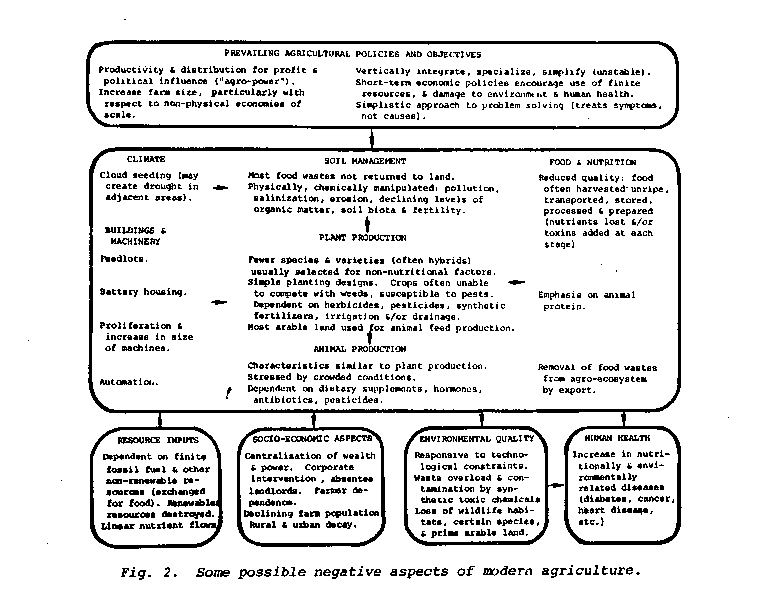
The use of energy studies to establish food policies has been criticized by two quite different groups. The first consists of those who are perhaps unconvinced, not because of a lack of good data, but rather because of their deep-rooted attachment to current views, which they may have adopted for reasons other than their scientific validity. We suspect that many of them find it difficult to accept change, and regard such analyses as a threat to the status quo, which may be based on their academic, political, social, religious and/or economic interests. Some of their arguments are characterized by one or more of the following:
1) A comparison of energy with money as a basis for decision making [13,31]. Our present problems reflect the inherent inability of money to indicate optimal choices for our species. Consequently, the search for an alternative measure is valid. However, the use of energy alone would also create problems. One response to the criticism that the energy approach is too limiting has been that studies be carried out in other (narrow) areas. Thus, from energy we might move to study proteins, vitamins, trace minerals, fiber, job quality, environmental impact, etc. The list is endless. However, at the present time the findings can only be expected to generate a response if they are profitable. By applying this criterion we are essentially compromising our survival.
2) Diversionary tactics, based on past accomplishments and future needs for increased food production [18, 33]. While we have raised levels of production by the use of machinery and chemicals, this has increased our dependence on finite resources and has led to environmental damage. In addition, these increases have often not benefited the poor who, because of their unchanged financial situation, are unable to buy the extra food [8]. Consequently, arguments based on comparisons between present and past standards of living are of little value in suggesting viable options for the future. Further increases in production will undoubtedly be required, but they, clearly, cannot be achieved in the same way [29].
3) The identification of limitations and sources of error in the methods used, or illogicalities in the interpretation of the data [33]. (Some even appear to draw their own conclusions and then proceed 'so criticize these ideas as if they were embodied in the original studies [50,54]). As has been indicated above, energy studies have already revealed several very important deficiencies in our food system, despite their imperfect methodology. In trying to respond to these criticisms there is a danger that improvement of the methodology becomes the primary objective rather than the original problem. In this way the "energy pit" is dug and solutions are proposed that are inappropriate, particularly in the long-term. For example, Commoner [11] has accepted Professor C. M. Woodruff's view that the purpose of agriculture is "to capture solar energy" rather than "to produce food and fiber." While this may lead to the adoption of strategies that will alleviate the energy crisis it could, through the selection of photosynthetically efficient crops, result in the propagation of plants that are less able to compete with weeds, resist pests and diseases, or maintain soil fertility, or that are deficient in certain nutrients.
The other critical group, of which we are members, consider that our food and energy problems are a consequence of our political and socio-economic system [57] and therefore energy studies alone are unlikely to generate the changes in policy that are necessary.
Our political and economic systems, by only requiring us to examine short-term relationships, have deluded us into believing that organisms and environments can be forced to conform to artificial and not ecological laws. The tendency for many harmful effects to take a long time to manifest themselves has encouraged this attitude. However, the problems that we now encounter are symptomatic of this approach. Most of the solutions being proposed are developed without consideration for their broader or long-term effects.
The generation of these solutions to by-pass nature may be regarded simply as irresponsible dreaming. Unfortunately, we are indulging in this type of dreaming when we imagine that we can solve problems of infertile soils, pests, diseases and deficient foods simply by means of inorganic fertilizers, pesticides, antibiotics and food supplements, respectively. me proposal of these kinds of solutions is symptomatic of a science trapped in the stranglehold of inductive logic and reductionism. Adherence to these approaches is preventing us from dealing with the causes of our problems.
Pests do not arise because of a deficiency of pesticide in the environment any more than headaches result from a lack of aspirin in the blood system. We get headaches because of the way in which we conduct our lives, and we get pests in the fields because of the way we manage them [27,43,71].
In addition to the above criticism, solutions to symptoms eventually create problems in other areas. Hence, in order to increase yields, nitrogen fertilizers, synthesized from natural gas, are being applied to our soils in ever-increasing amounts. me side effects of this include the depletion of natural gas reserves, the contamination of food and water with nitrates, resulting in health and pollution problems, damage to the ozone layer by nitrous oxides, and the accelerated decomposition of soil organic matter. The associated loss of soil structure has led to increased erosion. me use of synthetic, inorganic fertilizers has also allowed us to discard food and agriculture wastes rather than returning them to agricultural land as fertilizer. m us, most food wastes are incinerated, released into bodies of water, or deposited on non-productive land as landfill, causing air, water, or land pollution, respectively.
Rather than work within the natural, cyclical nutrient flows we have used manpower and resources to establish linear systems. The fact that they function within the framework of our short-term economic view only justifies them economically. Ecologically, linear systems make no sense at all.
Unfortunately, we have allowed powerful bureaucracies to develop that are only able to generate and implement these "specialist (simplistic) solutions." Also, it is questionable whether they are even anxious to solve the problems in the long-term, as this would deprive them of their power. It is little wonder that alternative lines of research are systematically stifled.
Solutions to symptoms are guaranteed to be addictive and disruptive. While our present system provides the means for generating profit, employment and political power, it is a treadmill that we must get out of if we are to deal with the causes of our problem.
It is important to realize that our survival is dependent on ecological, not economic relationships with the environment; consequently, economic systems must develop around ecological realities. Therefore, in order to establish agricultural policies that can be permanent, we have to recognize (1) the current state of our food system; (2) our needs, and the ways in which agriculture can satisfy them; and (3) the laws of nature and limitations of the environment. It is a matter of recognizing where we are now, deciding where we want to go, and finding out how to get there.
Our present "production for profit" food system has evolved from one in which production was for "use." In striving to survive economically, agriculture has increased production per area and per farmer. This has not only led to an increased dependence on non-renewable resources, but it has also become a threat to its renewable resource base, and to human health. The farmer is unfortunately in a weak position: he has little control over costs of his outputs, no control over his inputs, he is unfairly taxed and continually having to run to the bank manager in order to bail himself out. Few other sectors of society are so vulnerable. Consequently, it is unlikely that the farmer will be able to correct this situation alone.
It is our view that this state of affairs has already led to a loss of food quality. The ways in which the nutritional quality of plant materials might be decreased are illustrated in Fig. 3. This deductive model is based on the concept of R. Williams [68], that the body can only suffer from two nutritional problems--lack of certain required nutrients (malnutrition) and the presence of toxins (poisoning). The model asks how our various food production and handling practices might affect the nutritional and toxic status of food currently available. Thus: (1) Most plants are selected for factors other than nutritional quality, such as appearance, shelf life, productivity [51,58] and ability to be harvested by machines. (2) The crop that is planted on a particular soil within a certain climatic zone is determined largely by profit criteria, with little regard for the relationships between soil conditions and food quality [1,2,20,30,39,44,48,52,64]. (3) The application of certain inorganic plant nutrients can create imbalances in other nutrients [1,20]. (4) The use of pesticides adds toxins [3,16,53,62]. (5) Harvesting is often done before the crop is ripe, preventing it from achieving its full nutritional potential. Agricultural effects on food quality are relatively minor compared with those that occur during processing, transportation, storage and preparation [3,16,22,32,55, 62,63]. Emus, by allowing the profit motive to dictate practices, it is likely that nutrients will be lost and/or toxins added at every stage of production and handling, and food quality will gradually decline.
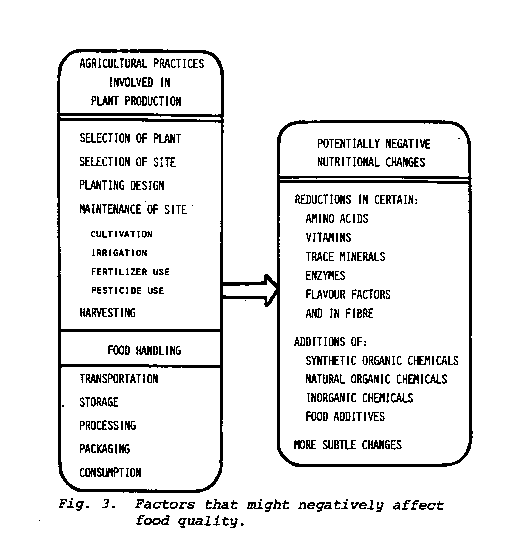
This is particularly important because our nutritional requirements have increased, partly as a result of exposure to the growing number of poisons in the environment that require detoxification [53,70]. Thus, we have a greater need for high quality food, which cannot be satisfied by current agricultural practices. Ironically, the system that should supply us with this food is, instead, contaminating it with poisons and decreasing its nutrient content.
The increase in degenerative diseases in the developed world, and in less developed areas under the influence of the former [6], should not come as a surprise. Degeneration is the consequence of genetic predisposition, malnutrition' toxification (through food, air and water) [14,38,52], lack of exercise, stress and inadequate relaxation (Fig. 1). This makes common sense, yet the dominant approaches being taken to deal with degenerative diseases include the search for causative organisms, the physical or chemical destruction of degenerative tissues (remember that the surgeon reigns supreme within the medical profession), and the masking of the situation with pain killing drugs. m is tendency to deal with symptoms rather than with causes, which is equally prevalent in medicine and agriculture, has become the major degenerative disease of science.
Thus, we consider that the prevention of degenerative diseases will require not just medical approaches, but the combined efforts of agriculturalists, nutritionists, geneticists, environmental scientists, clinical ecologists, and experts concerned with physical and mental health.
In order to survive in a healthy, contented state we essentially have to develop a symbiotic relationship with our support environment. This requires that we identify our real needs [14,381 and the ability of the environment to satisfy them. Economists frequently distinguish between "real needs" (basic food, shelter and clothing) and "manipulated or nonessential wants" (many of which we strive for to lift us above our fellows). All too often "real needs" are sacrificed for the latter.
The food industry has manipulated our eating habits in order to dispose of the surpluses generated by our highly specialized and "efficient" production system. Thus, more money is now spent on foods such as corn, wheat and potatoes in their highly processed and nutritionally inferior forms (e.g. cornflakes, cookies and potato chips), than in their » re valuable elemental state [23]. m e processing industry, through the clever use of advertising, has become so successful that it now dominates the food system [26,42], and agriculture has been relegated to the position of merely supplying the raw materials. Hence, agriculture now caters largely to "manipulated wants."
Unless we change our myopic view of efficiency, we are misleading ourselves in believing that a more "efficient" agricultural system is the panacea for the food and energy crisis. Changes in policy will result in "real' progress only if such increases in efficiency are concerned with the production and fair distribution of items that we really need.
In considering this subject we have repeatedly felt that the problems that we have identified above are so obvious, yet real attempts to deal with these problems at the causal level have not been stimulated. Why do most people find it so difficult to deal with these problems? mere appear to be three reasons for this. First, we have become so adapted to the present situation that we find it difficult to view ourselves objectively. me tendency to defend the status quo and to recognize problems as being apart from ourselves provides evidence of this. Second, the information explosion and expanding scale of production has forced people to specialize. me increase in inductive and reductionist approaches in science and the tendency to deal with symptoms rather than causes, discussed above, is associated with this. In this way it has become increasingly difficult for people to comprehend the complex realities of nature. Bird, most religions and political ideologies tend to separate us from the support environment, e.g. our "dominion over nature" [67]. This has been considerably reinforced over the past hundred years by our use of fossil fuels to free ourselves from the constraints that dominated the lives of our ancestors. For example, when it is hot we tend to seek places that are air conditioned; we no longer know where the naturally cool areas are within the environment.
In order to counteract these problems we must make a conscious effort to examine ourselves objectively, comprehensively, and in relation to the support environment. One way to do this is to ask questions of ourselves that an ecologist would ask when studying other organisms, i.e. how many are there (for us, how many is optimum); how are they distributed (how should and shouldn't we distribute ourselves); and what are they doing (what should and shouldn't we do). me relationships between these three variables and the support environment are shown in Fig. 4. There has been a tendency for many people concerned with the food crisis to regard it as a population problem. However, we cannot expect to solve our problems by reducing population growth if some or all members of the remaining population continue to distribute themselves out of context with the environment, or indulge in activities that are a threat to survival
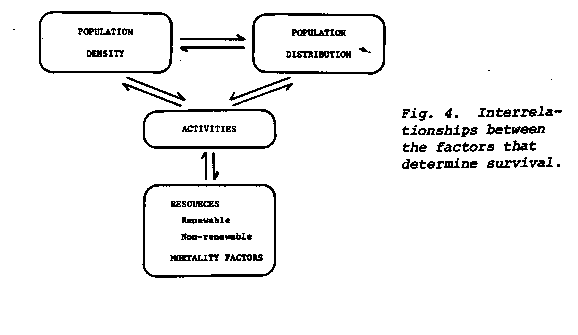
In deciding what we should and should not do, it is useful to consider the following four "laws of nature" [9,10,12]. All species, including our own, are subject to these laws.
The fact that we have been able to follow a "live-now-pay later" philosophy for so long should not be taken as evidence to the contrary. The earth has an enormous amount of capital in the form of fossil fuels and other non-renewable resources, soil fertility, and ecosystem stability (which has evolved over millions of years through increased complexity). We have developed a lifestyle dependent on the exploitation of this capital [46]. It is understandable that people are not willing to sacrifice those activities and lifestyles that are supported by these resources, and hence, they become defensive when it is suggested that they will have to reduce this dependence.
The first law of nature is that survival for any species, whether it is a plant, animal or microorganisms, is dependent on needs, the availability of what is needed, and on various mortality factors. If we examine our current food system we find that it contravenes this law at every stage. We are producing many things that we do not need. me system is based on non-renewable resources, and some of the technologies that we employ are lethal or sub-lethal, e.g. injuries by machinery and poisoning by toxic chemicals. me implication for policy makers is that they should support efforts to distinguish between real needs and manipulated wants and establish a safe food system based on renewable resources.
The second law is that relationships are cyclical. Modern agriculture is characterized by linear nutrient flows. Thus, we produce fertilizer to feed plants, to feed animals, to feed people, to pollute rivers. It is essential that we abandon this practice and develop cyclical systems, e.g., return natural organic waste materials to the land as fertilizer.
The third law is that all natural ecosystems become more complex with time. Complex systems develop naturally by means of energy from the sun. It is ironic that we have developed a food system that is based on simplifying the biological components of the environment by means of a technology of increasing complexity; thus, the farmer needs to know less and less about biology and more and more about engineering, chemistry and economics. In trying to keep the agro-ecosystem simple, we are essentially using fossil fuel instead of the energy from the sun. Clearly we must learn how to manage complex biological systems, e.g., mixed culture of crops.
The fourth law is that there are various biochemical constraints that apply to all life such that many organic compounds do not exist in living organisms. Consequently, the decomposers that break down dead organisms are adapted to a very restricted diet. us, if organic compounds are produced that have no counterpart in nature, they will not be likely to break down biologically. We must establish a lifestyle that relies only on organic materials that have a counterpart in nature and ban or severely restrict the production of other organic chemicals.
The laws of nature know no compromise. They are constant at least within the framework of human history, and the sooner that our species becomes aware of these laws and establishes political, social and economic systems that are consequential upon them, the sooner we will be able to move towards real solutions to our problems.
Our preliminary views of what a "permanent" food system might involve are presented in Fig. 5 [see also 21,34,40,41, 56,65,69]. In drafting this we have taken the above constraints into consideration. The differences between this and our present food system may be seen » st clearly by comparing Figs. 2 and 5.
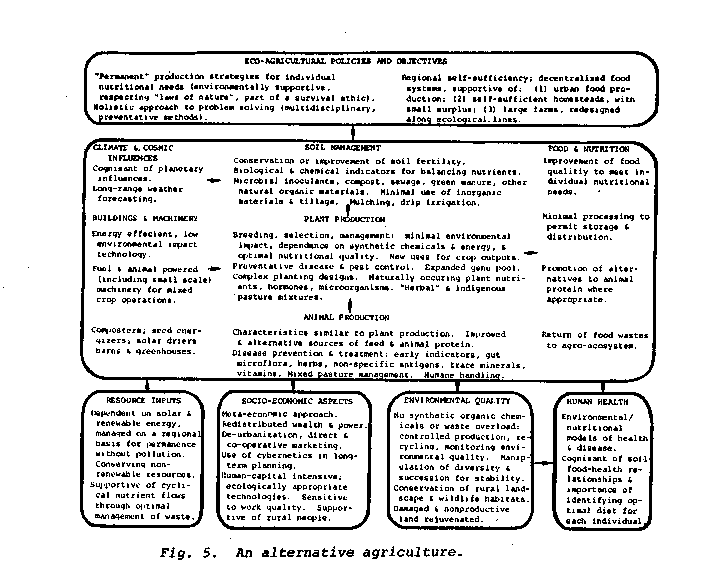
The only group of agricultural producers who are currently attempting to utilize a significant number of these approaches are the "organic" farmers. Some agriculturalists, however, have argued that the people of the world cannot be fed by employing these methods [5]. A number of years ago Dr. O. W. Grussendorf [22] of Manitoba set out to prove that this was not so. He selected a piece of land that was declared completely unfit for agriculture. In fact, it was so unfit that he purchased it for one dollar an acre. He established a mixed farm, composted his waste biodynamically [60], and applied this to his land, while importing no fertilizers, pesticides or other materials into the system. In 1968 he produced 1000 bushels of potatoes an acre and 50 bushels of top quality wheat; the average for Canada, at that time, was 168 and 22 bushels, respectively.
It is our opinion that we could learn much by studying the methods of such people as Dr. Grussendorf, for they are doing what many conventional agriculturalists regard as impossible [5]; and their efficient use of energy [36,37] represents only one feature of the system that they are employing. (Several other successful "organic" farmers are interviewed in Christopher Chapman's recent film for the National Film Board of Canada entitled "A Sense of Humus", 1976.)
Currently our food system is designed to produce food that can be sold rather than food to meet real needs. It is imperative that we establish systems for producing food (and fiber) that can be "permanent," and ways of identifying each individual's nutritional needs. As these are both determined by laws of nature, it is essential that we become aware of them.
Many changes will be required if we are to develop a viable alternative food system. While energy studies have revealed several weaknesses within the present system, far reaching political and socio-economic changes will be needed in order to create an environment in which those involved can respond to the findings. m is situation will similarly prevent people from adequately responding to the findings of any other studies of the food system. Consequently, scientists are naive if they expect that the required changes will necessarily follow the carrying out of high quality research. One potentially serious weakness within our food system, to which energy studies do not address themselves, is that food quality may be compromised at every stage within the food chain. Unless attention is paid to this situation we predict that there will be further increases in the incidence of degenerative diseases. Indeed, this situation may be already further advanced than we suspect.
We are encouraged, however, by the recent food and nutrition policies implemented by the Norwegian Government [4]. They have established models of consumption based on health and resource considerations and have proceeded to implement policies that will lead to changes in production and eating habits. For example, the price of range-fed beef, which contains less saturated fats than feedlot beef, has been reduced below that of the latter. They expect, among other things, that this will help to reduce the incidence of heart disease.
It is our hope that other countries will soon examine their food systems and make the necessary changes in policy.
1. Albrecht, W.A. 1975. The Albrecht Papers. Acres USA, Raytown, Mo.
2. Balfour, Lady Eve. 1975. The living Soil and the Haughley Experiment. Faber & Faber, London.
3. Bicknell, F. 1960. Chemicals in Food and in Farm Produce: Their Harmful Effects. Faber & Faber, London.
4. Blythe, C. 1976. Eating your way out of debt and disease. New Scientist 70:278-280.
5. Butz, E. 1971. Television Program Meet the Press, (NBC), Dec. 12. Quoted in: Pater, A.F. and J.R. Pater, eds. What They Said in 1971: The Yearbook of Spoken Opinion. Monitor Book Co., Beverly Hills, Cal, p. 123.
6. Cairns, J. 1975. me cancer problem. Sci. Amer. 233(5): 64-78.
7. Cervinka, V., W.J. Chancellor, R.J. Coffelt, R.G. Curley and J.B. Dobie. 1974. Energy requirements for agriculture in California. Calif. Dept. Food and Agric. Agric. Eng. Dept., Univ. of Calif., Davis.
8.Chancellor, W.J. and J.R. Goss. 1976. Balancing energy and food production. Science 192:213-218.
9. Commoner, B. 1970. The ecological facts of life. In: H.D. Johnson, ed. No Deposit - No Return: Man and His Environment: A View Toward Survival. Addison-Wesley, Don Mills, Ont., pp. 18-35.
10. Commoner, B. 1971. The Closing Circle: Man, Nature and Technology. Alfred A. Knopf, Inc., New York.
11. Commoner, B. 1976. The Poverty of Power: Energy and the Economic Crisis. Alfred A. Knopf, Inc., New York.
12. Dansereau, P. 1966. Ecological impact and human ecology. In: Darling, F.F. and J.P. Milton eds. Future Environments of North America. Nat. Hist. Press, Garden City, N.Y., pp. 425-462.
13. Darmstadter, J. 1975. Conserving Energy: Prospects and Opportunities in the New York Region. Johns Hopkins Univ. Press, Baltimore, Md.
14. Dickey, L.D.,ed. 1976. Clinical Ecology. Chas. C. Comas, Springfield, Ill.
15. Elrick, D.E., et al. 1975. Energy and agriculture in Ontario. Ontario Inst. Agrology, Ontario.
16. Epstein, S.S. and R.D. Grundy, eds. 1974. Consumer Health and Product Hazards of Cosmetics and Drug, Pesticides, Food Additives. Vol. 2 of The Legislation of Product Safety. M. I. T., Cambridge, Mass.
17. Fritsch, A.J., L.W. Dujack and D.A. Jimerson. 1975. Energy and Food: Energy Used in Production, Processing, Delivery and Marketing of Selected Food Items. Center for Science in the Public Interest, Energy Series VI. Washington, D.C.
18. Gavett, E.E. 1975. Can 1918 farming feed 1975 people? Farm Index 13(8):10-13.
19. Geno, L.M. 1975. Energy, Agriculture, and the Environment. Environment Canada, Ottawa, Ontario.
20. Gilbert, F.A. 1957. Mineral Nutrition and the Balance of Life. Univ. Oklahoma Press, Norman, Okla.
21. Goldsmith, E., R. Allen, M. Allaby, J. Davol and S. Lawrence. 1972. A Blueprint for Survival. Penguin Books, Harmondsworth Middx., U.K.
22. Grussendorf, O.W. 1969. Here's the evidence. Land Bulletin 146:1.
23. Hall, R.H. 1974. Food for Naught: The Decline in Nutrition. Vintage Books, Random House, N.Y.
24. Harris, M. 1967. Unpublished, quoted in Perelman, M.J. 1972. Farming with petroleum. Environment 14(8):8-13.
25. Heichel, G.H. 1973. Comparative efficiency of energy use in crop production. Conn. Agric. Exp. Sta. Bull. 739, New Haven, Conn.
26. Hightower, J. 1975. Eat Your Heart Out: Food Profiteering in America. Crown Press, New York.
27. Hill, S.B. Preventative pest control. Alternatives. (in press).
28. Hirst, E. 1974. Energy for food: Trans. A.S.A.E. 17:323-326.
29. Horsfall, J.G., et al. 1975. Agricultural Production Efficiency. Nat. Acad. Sci., Washington, D.C.
30. Howard, Sir Albert. 1947. The Soil and Health: A Study of Organic Agriculture. Schocken Books, N.Y.
31. Huettner, D.A. 1976. Net energy analysis: An economic assessment. Science 19? 101-104.
32. Hunter, B.T. 1975. The Mirage of Safety: Food Additives and Federal Policy. Chas. Scritner's Sons, New York.
33. Kolmer, L. 1975. Conventional vs. organic farming. Ag. World 1(11):17.
34. Lappé, F.M., J. Collins and C. Fowler. Food First. Inst. Food and Dev. Poll, Hastings-on-Hudson, N.Y. (in press)
35. Lockeretz, W. 1975. Agricultural resources consumed in beef production. Rpt. CBNS-AE-3. Center for the Biology of Natural Systems, Washington Univ., St. Louis, Mo.
36. Lockeretz, W., R. Klepper, B. Commoner, M. Gertler, S. Fast, D. O'Leary and R. Blobaum. 1975. A comparison of the production, economic returns, and energy intensiveness of Corn Belt farms that do and do not use inorganic fertilizers and pesticides. Rpt. CBNS-AE-4. Center for the Biology of Natural Systems, Washington Univ., St. Louis, Mo.
37. Lockeretz, W., R. Klepper, B. Commoner, M. Gertler, S. Fast and D. O'Leary. 1976. Organic and conventional crop production in the Corn Belt: a comparison of economic performance and energy use for selected farms. Rpt. CBNSAE-7. Center for the Biology of Natural Systems, Wash. Univ., St. Louis, Mo.
38. MacKarness, R. 1975. Not All in the Mind. Pan Books, London.
39. McCarrison, Sir Robert. 1961. Nutrition and Health. Faber & Faber, London.
40. Merrill, R. 1974. Toward a self-sustaining agriculture. J. New Alchemists 2:44-61.
41. Merrill, R. ed. 1976. Radical Agriculture. Harper & Row, New York. ~
42. Mitchell, D. 1975. The Politics of Food. James Lorimer & Co., Toronto.
43. Moore, N.W. 1967. A synopsis of the pesticide problem. Adv. Ecol. Res. 4:75-129.
44. Mount, J.L. 1975. Food and Health of Western Man. Charles Knight & Co., London.
45. Mowat, D.N., et al. 1974. Efficiency of production of meat and milk. In Proc. Ont. Inst. Agrol. 15th Ann. Conf. (Apr. 22), Guelph, Ont.
46. Odum, H.T. 1970. Environment, Power and Society. Wiley, New York.
47. Othmer, D.F. 1970. Man versus materials. Trans. N. Y. Acad. Sci., Ser. II 32(3):287-303.
48. Picton, L.J. 1946. Nutrition and the Soil. Devin-Adair, Old Greenwich, Conn.
49. Pimentel, D., E. Hurd, A.C. Bellotti, M.J. Forster, I.N. Oka, O.D. Sholes and R.J. Whitman. 1973. Food production and the energy crisis. Science 182:443-449.
50. Pimentel, D. 1975. Food production and the energy crisis: A comment. Science 187:561.
51. Pirie, N.W. 1972. The direction of beneficial change. Ecol. Food Nutr. 1: 279-294.
52. Price, W.A. 1945. Nutrition and Physical Degeneration. Price-Pottenger Nutrition Foundation, Santa Monica, Cal.
53. Randolph, T.G. 1962. Human Ecology and Susceptibility to the Chemical Environment. Chas. C. Thomas, Springfield, Ill.
54. Ruttan, V.W. 1975. Food production and the energy crisis A comment. Science 187:560-561.
55. Schroeder, H.A. 1974. The Poisons Around Us: Toxic Metals in Food, Air, and Water. Indiana Univ. Press, Bloomington, Ind.
56. Schumacher, E.F. 1974. Small is Beautiful: A Study of Economics as if People Mattered. Abacus, London.
57. Scorer, R. 1973. In pursuit of ecological wisdom. New Scientist 67:652-653.
58. Shertz, L.P. 1972. World food needs. Ecol. Food Nutr. 1. 207-212.
59. Southwell, P.H. and T.M. Rothwell. 1976. Analysis of output/input energy ratios of crop production in Ontario. School of Engineering, Univ. of Guelph, Ont.
60. Steiner, R. 1958. Agriculture. Bio-Dynamic Agricultural Assoc., London.
61. Steinhart, J.S. and C.E. Steinhart. 1974. Energy in the U.S. food system. Science 184:307-316.
62. Turner, J.S. 1970. The Chemical Feast: The Ralph Nader Study Group Report on Food Protection and the Food and Drug Administration. Grossman Publ., New York.
63. Verrett, J. and J. Carper. 1974. Eating May be Hazardous to Your Health: How Your Government Fails to Protect You from the Dangers in Your Food. Simon 6 Schuster, New York.
64. Voisin, A. 1959. Soil, Grass and Cancer: Health of Animals and Men is Linked to the Mineral Balance of the Soil. Crosby Lockwood, London.
65. Walters, C. 1975. The Case for Eco-Agriculture. Acres, USA, Raytown, Mo.
66. Warkentin, B.P. (Personal communication). Dept. of Renewable Resources, Macdonald Campus of McGill Univ., Quebec.
67. White, L. 1967. The historical roots of our ecologic crisis. Science 155:1203-1207.
68. Williams R.J. 1971. Nutrition Against Disease: Environmental Prevention. Pitman Publ. Corp., New York.
69. Wolf, R. ed. 1975. Organic Farming: Yearbook of Agriculture. Rodale Press, Emmaus, Pa.
70. World Health Organization. 1972. Health Hazards of the Human Environment. W. H. O., Geneva.
71. Yarwood, C.E. 1970. Man-made plant diseases. Science 168:218-220.
Copyright © 1977
Info Request | Services | Become EAP Member | Site Map
Give us your comments about the EAP site
Ecological Agriculture Projects, McGill University (Macdonald
Campus)
Ste-Anne-de-Bellevue, QC, H9X 3V9 Canada
Telephone:
(514)-398-7771
Fax:
(514)-398-7621
Email: eapinfo@macdonald.mcgill.ca
To report problems or otherwise comment on the structure of this site, send mail to the Webmaster